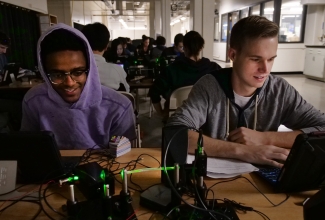Promoting students' sense of ownership over their work is an important aspect of learning, both in instructional and research settings. The importance of ownership is recognized by many instructors and advisors to be an important outcome of their students' efforts. However, for many instructors and researchers, what it means to have a sense of ownership may be understood only in broad and surface-level terms. In physics, one promising venue for engaging students in projects over which they feel ownership is the instructional lab course. However, the way ownership manifests as well as how it is developed has not been well studied within the PER community.
In the broader science education environment outside of PER, there have been efforts to define ownership and identify features of students' experiences that promote it. Ownership can be defined as consisting of three aspects: feeling responsible for, committed to, and personally connected to the project. Features of students' experiences that promote this are (i) interest in the project, (ii) demonstrating agency in managing the project, (iii) expressing positive affect about the project, (iv) demonstrating a willingness to contend with challenges, and (v) working productively with others.
However, how ownership of one's project manifests may depend largely on the context in which it is experienced. For this reason, we investigated how ownership manifests for students in the context of upper-division physics lab courses that have open-ended projects as a central part of the course.
Project-Based Lab Courses
The courses we studied focused on topics in contemporary optics and had a seven-week-long project. The design of the courses was anticipated to promote student ownership: the projects were chosen by the students, were informed by research, had minimal scaffolding, and were directed by the students themselves. Through pre- and post-project interviews as well as weekly student reflections (all designed to probe for the presence of the features anticipated to promote ownership), we outlined how student ownership manifests in this environment. The aim of these efforts was to broaden the framework of ownership to encapsulate the physics lab context.



 The Physics Frontiers Centers (PFC) program supports university-based centers and institutes where the collective efforts of a larger group of individuals can enable transformational advances in the most promising research areas. The program is designed to foster major breakthroughs at the intellectual frontiers of physics by providing needed resources such as combinations of talents, skills, disciplines, and/or specialized infrastructure, not usually available to individual investigators or small groups, in an environment in which the collective efforts of the larger group can be shown to be seminal to promoting significant progress in the science and the education of students. PFCs also include creative, substantive activities aimed at enhancing education, broadening participation of traditionally underrepresented groups, and outreach to the scientific community and general public.
The Physics Frontiers Centers (PFC) program supports university-based centers and institutes where the collective efforts of a larger group of individuals can enable transformational advances in the most promising research areas. The program is designed to foster major breakthroughs at the intellectual frontiers of physics by providing needed resources such as combinations of talents, skills, disciplines, and/or specialized infrastructure, not usually available to individual investigators or small groups, in an environment in which the collective efforts of the larger group can be shown to be seminal to promoting significant progress in the science and the education of students. PFCs also include creative, substantive activities aimed at enhancing education, broadening participation of traditionally underrepresented groups, and outreach to the scientific community and general public.